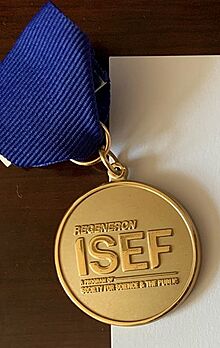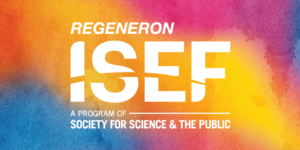International Science and Engineering Fair facts for kids
Quick facts for kids International Science and Engineering Fair |
|
|---|---|
| Country | United States |
The Regeneron International Science and Engineering Fair (ISEF) is a huge yearly science competition held in the United States. It's like the Olympics for young scientists and engineers! The Society for Science, a non-profit group, runs this amazing event.
Every May, over 1,800 talented students gather. They come from about 75 different countries and regions. These students compete for awesome prizes. These include scholarships, money for college, internships, and even scientific field trips. The top prizes are very generous, with one $75,000 and two $50,000 college scholarships. In total, over $8,000,000 in prizes are given out!
ISEF started way back in 1950. It was created by Science Service, which is now the Society for Science. For many years, Intel was a main sponsor. Since 2020, Regeneron Pharmaceuticals has been the main sponsor. Due to the COVID-19 pandemic, some recent fairs were held online. But now, ISEF is back to being an in-person event, bringing young innovators together.
| Top - 0-9 A B C D E F G H I J K L M N O P Q R S T U V W X Y Z |
Famous Faces from ISEF
Many bright minds have participated in ISEF. Some have gone on to achieve incredible things in science and beyond. Here are a few examples:
- Richard Zare (1957): A famous American chemist. He won a top science award in 1983.
- James Gunn (1957): An astronomer who won the National Medal of Science.
- John Clauser (1959 & 1960): A physicist who won the Nobel Prize in Physics in 2022.
- Paul Modrich (1964): A biochemist who won the Nobel Prize in Chemistry in 2015.
- Susan Solomon (1972): An atmospheric chemist who won a top science award.
- Alexandria Ocasio-Cortez (2007): She became a United States Congresswoman.
- Alex Deans (2013): A young inventor.
- Eesha Khare (2013): Another talented inventor.
How to Compete at ISEF
To become an ISEF finalist, students first compete in smaller science fairs. These are usually regional, district, or state-level fairs. These local fairs pick the best projects. Then, those winners get the chance to go to ISEF!
Students can enter with individual projects. They can also work in teams of two to four high school students. Besides showing off their projects, students get to explore the host city. There are tours and fun activities. It's also a great chance to meet other students. They can share ideas and make new friends. Many seminars are also held for students, mentors, and teachers.
Projects are judged in 22 different subject categories. This ensures that all kinds of scientific ideas can be explored. Some of the categories include:
- Animal Sciences
- Behavioral and Social Sciences
- Biochemistry
- Biomedical and Health Sciences
- Chemistry
- Earth and Environmental Sciences
- Mathematics
- Microbiology
- Physics and Astronomy
- Robotics and Intelligent Machines
Amazing Prizes and Awards
ISEF offers many prestigious awards to recognize outstanding projects. Here are some of the top honors:
- George Yancopoulos Innovator Award: This is the top prize, a $75,000 scholarship. It goes to a project that shows truly innovative research. The project must have the potential to make a big impact.
- Regeneron Young Scientist Awards: Two projects receive $50,000 awards from Regeneron and SSP.
- The Gordon E. Moore Award for Positive Outcomes for Future Generations: This award gives $50,000 to a project that looks to improve the future.
- Dudley R. Herschbach SIYSS Award: Winners get an all-expenses-paid trip to the Stockholm International Youth Science Seminar. They also get to attend the Nobel Prize ceremonies!
- Craig R. Barrett Award for Innovation: A $10,000 award for a project that shows great innovation. It combines science, technology, engineering, and math.
- H. Robert Horvitz Prize for Fundamental Research: This $10,000 prize is for research that helps us understand science or math better. It focuses on basic discoveries, not just inventions.
- Peggy Scripps Award for Science Communication: A $10,000 award for the student who can best explain their project. They must make it easy for anyone to understand.
- EU Contest for Young Scientists Award: This award offers a trip to the European Union Contest for Young Scientists.
Many other organizations also give out special awards. These include groups like the National Security Agency and the Association for Computing Machinery.
Since 2001, MIT's Lincoln Laboratory has even named asteroids after ISEF winners!
The Finalist Medal
| Finalist of the Regeneron ISEF |
|
|---|---|

ISEF finalist medal
|
|
| Awarded by Society for Science and Regeneron | |
| Type | medal award |
| Established | 1950 |
| Country | held United States but an international competition |
| Ribbon | blue and yellow |
| Motto | "Future Forward" |
| Eligibility | Participate in an affiliated fair and be selected (criteria varies by fair) |
| Status | ISEF |
| Founder | Gordon E. Moore |
| Grades | George Yancopoulos Innovator Award Regeneron Young Scientist Award Regeneron ISEF Best of Category Awards Regeneron ISEF Grand Awards Regeneron ISEF Special Awards Regeneron ISEF Experiential Awards Dudley R. Herschbach SIYSS Award Regeneron ISEF Gordon E. Moore Award for Positive Outcomes for Future Generations Regeneron ISEF Craig R. Barrett Award for Innovation Regeneron ISEF H. Robert Horvitz Prize for Fundamental Research Regeneron ISEF Peggy Scripps Award for Science Communication |
| Statistics | |
| First induction | 1950 |
| Precedence | |
| Next (lower) | Varies, depending on rank |
Finalist Medal (gold with blue ribbon) |
|
About 1,800 students from 75 countries receive the Regeneron ISEF Finalist Medal each year. These are the students who make it to the main ISEF competition.
Millions of students take part in local science fairs every year. The winners of these smaller fairs get the chance to become an ISEF finalist. Each finalist receives this special medal. The medal is golden and has the ISEF logo on one side. The other side shows the year and location of the fair. It hangs from a blue ribbon with a golden "1" in the middle.
Recent Top Prize Winners
Since 1997, the top awards have been given to the most outstanding projects. Here are some of the recent winners:
- ISEF 2021 (Virtual Event)
- George D. Yancopoulos Innovator Award: Michelle Hua (Troy, MI)
- Young Scientist Award: Catherine Kim (Jericho, NY)
- Young Scientist Award: Daniel Shen (Cary, NC)
- ISEF 2022 (Atlanta, Georgia)
- George D. Yancopoulos Innovator Award: Robert Sansone (Fort Pierce, FL)
- Young Scientist Award: Rishab Jain (Portland, OR)
- Young Scientist Award: Abdullah Al-Ghamdi (Dammam, Saudi Arabia)
- ISEF 2023 (Dallas, Texas)
- George D. Yancopoulos Innovator Award: Kaitlyn Wang (San José, CA)
- Young Scientist Award: Saathvik Kannan (Columbia, MO)
- Young Scientist Award: Teepakorn Keawumdee, Pannathorn Siri, & Poon Trakultagmun (Bangkok, Thailand)
- ISEF 2024 (Los Angeles, California)
- George D. Yancopoulos Innovator Award: Grace Sun (Lexington, KY)
- Young Scientist Award: Michelle Wei (San Jose, CA)
Other Science Competitions
The Society for Science also organizes other exciting science competitions for young people:
- The Regeneron Science Talent Search: This is another major science competition. It was previously sponsored by Westinghouse and Intel.
- The Thermo Fisher Scientific Junior Innovators Challenge: This competition was formerly known as Broadcom MASTERS. It focuses on "Math, Applied Science, Technology, & Engineering for Rising Stars."


